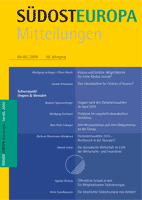Visa Liberalisation for Citizens of Kosovo – A Critical Analysis of the Current State of Play and Future Perspectives
Visa Liberalisation for Citizens of Kosovo – A Critical Analysis of the Current State of Play and Future Perspectives
Author(s): Gunda SchumannSubject(s): Politics / Political Sciences
Published by: Südosteuropa Gesellschaft e.V.
Summary/Abstract: The Thessaloniki Agenda, offering Western Balkan countries a future perspective in the European Union, has become tangible at last: Citizens of FYR Macedonia, Montenegro and Serbia may travel to the Schengen zone without visa, while Albania and Bosnia & Herzegovina will follow suit soon. However, one territory in the Western Balkans has been left out in the cold: Kosovo. It has neither become a partner of any “visa dialogue”, nor are its citizens entitled to receive Serbian biometric passports. The former Yugoslav province, facing incomplete recognition as an independent state due to its sui generis status, is caught between a rock and a hard place: Currently, it will have to rely on its own momentum for tackling reforms required to obtain visa liberalisation, however, without tangible incentives. As to the author, what Kosovo needs instead is a “structured approach” that would enable the public to compare progress between countries and civil society to put pressure on the government in order to avert the risk of becoming a failing state eventually. To keep visa liberalisation from backfiring on EU member states, an integrated approach combining both visa liberalisation and socio-economic development is urgently needed.
Journal: Südosteuropa Mitteilungen
- Issue Year: 2010
- Issue No: 04-05
- Page Range: 20-37
- Page Count: 18
- Language: English
- Content File-PDF

